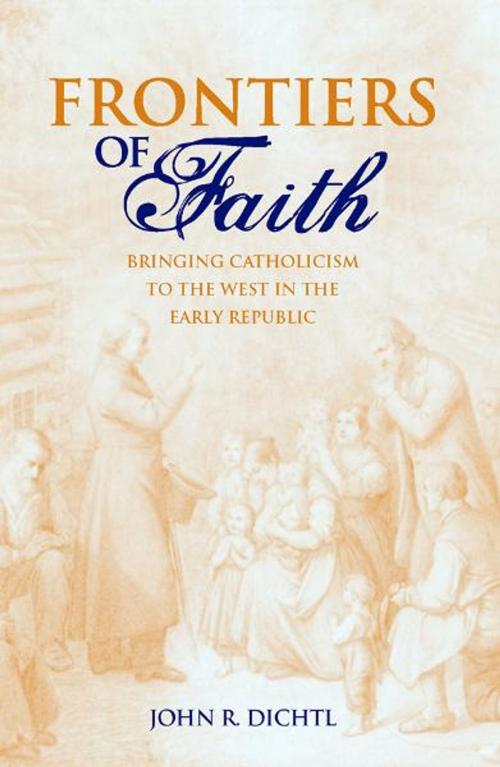Frontiers of Faith
Bringing Catholicism to the West in the Early Republic
Nonfiction, History, Americas, United States, 19th Century, Religion & Spirituality, Christianity, Denominations, Catholic, Catholicism| Author: | John R. Dichtl | ISBN: | 9780813138817 |
| Publisher: | The University Press of Kentucky | Publication: | May 2, 2008 |
| Imprint: | The University Press of Kentucky | Language: | English |
| Author: | John R. Dichtl |
| ISBN: | 9780813138817 |
| Publisher: | The University Press of Kentucky |
| Publication: | May 2, 2008 |
| Imprint: | The University Press of Kentucky |
| Language: | English |
American religious histories have often focused on the poisoned relations between Catholics and Protestants during the colonial period or on the virulent anti-Catholicism and nativism of the mid- to late nineteenth century. Between these periods, however, lies an important era of close, peaceable, and significant interaction between these discordant factions. Frontiers of Faith: Bringing Catholicism to the West in the Early Republic examines how Catholics in the early nineteenth-century Ohio Valley expanded their church and strengthened their connections to Rome alongside the rapid development of the Protestant Second Great Awakening. In competition with clergy of evangelical Protestant denominations, priests and bishops aggressively established congregations, constructed church buildings, ministered to the faithful, and sought converts. Catholic clergy also displayed the distinctive features of Catholicism that would inspire Catholics and, hopefully, impress others. The clerics' optimism grew from the opportunities presented by the western frontier and the presence of non-Catholic neighbors. The fruit of these efforts was a European church translated to the American West. In spite of the relative harmony with Protestants and pressures to Americanize, Catholics relied on standard techniques of establishing the authority, institutions, and activities of their faith. By the time Protestant denominations began to resent the Catholic presence in the 1830s, they also had reason to resent Catholic successes -- and the many manifestations of that success -- in conveying the faith to others. Using extensive correspondence, reports, diaries, court documents, apologetical works, and other records of the Catholic clergy, John R. Dichtl shows how Catholic leadership successfully pursued strategies of growth in frontier regions while continually weighing major decisions against what it perceived to be Protestant opinion. Frontiers of Faith helps restore Catholicism to the story of religious development in the early republic and emphasizes the importance of clerical and lay efforts to make sacred the landscape of the New West.
American religious histories have often focused on the poisoned relations between Catholics and Protestants during the colonial period or on the virulent anti-Catholicism and nativism of the mid- to late nineteenth century. Between these periods, however, lies an important era of close, peaceable, and significant interaction between these discordant factions. Frontiers of Faith: Bringing Catholicism to the West in the Early Republic examines how Catholics in the early nineteenth-century Ohio Valley expanded their church and strengthened their connections to Rome alongside the rapid development of the Protestant Second Great Awakening. In competition with clergy of evangelical Protestant denominations, priests and bishops aggressively established congregations, constructed church buildings, ministered to the faithful, and sought converts. Catholic clergy also displayed the distinctive features of Catholicism that would inspire Catholics and, hopefully, impress others. The clerics' optimism grew from the opportunities presented by the western frontier and the presence of non-Catholic neighbors. The fruit of these efforts was a European church translated to the American West. In spite of the relative harmony with Protestants and pressures to Americanize, Catholics relied on standard techniques of establishing the authority, institutions, and activities of their faith. By the time Protestant denominations began to resent the Catholic presence in the 1830s, they also had reason to resent Catholic successes -- and the many manifestations of that success -- in conveying the faith to others. Using extensive correspondence, reports, diaries, court documents, apologetical works, and other records of the Catholic clergy, John R. Dichtl shows how Catholic leadership successfully pursued strategies of growth in frontier regions while continually weighing major decisions against what it perceived to be Protestant opinion. Frontiers of Faith helps restore Catholicism to the story of religious development in the early republic and emphasizes the importance of clerical and lay efforts to make sacred the landscape of the New West.















